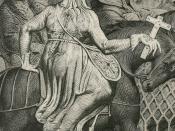Nearly every aspect of the Pardoner's tale is ironic. Irony
exists within the story itself and in the relationship between the
Pardoner and the story. The ending of the story presents a good
message despite the Pardoner's devious intentions to swindle money
from the other pilgrims. By using irony in the Pardoner's tale,
Chaucer effectively criticizes the church system.
The irony begins as soon as the Pardoner starts his prologue.
He tells the other pilgrims that his sermons reflect how money is
the root of all evils, 'radix malorum est cupiditas.' He actually
preaches against his own problems and sins. Pardoners who took
money in return for forgiveness were supposed to use the the money
for charity, but he, like many other Pardoner's in his time, used
the money for his own satisfaction. He even admits to his greed.
'And thus I preach against the very vice I make my living out of
avarice.'(p. 259) The Pardoner makes a mockery of the entire
church by fabricating stories about his phony relics. Chaucer
shows how the Church is so corrupt, that even a Pardoner who
admits to his evil ways, can still cheat the people out of their
money.
The Pardoner begins his story by condemning the common sins
of society such as drinking and gluttony. The irony of his
criticism lies in the fact that he has been drinking himself, and
that he is an admitted glutton. There are also many ironic
elements of the stor itself. The rioters in his story, vow to set
out and slay Death. In doing so, they promise to fight and die
for each other. There are two ironies in their mission. First,
Death is hardly a being that can be killed. Second, the three
drunken fighters pledge to die for...


